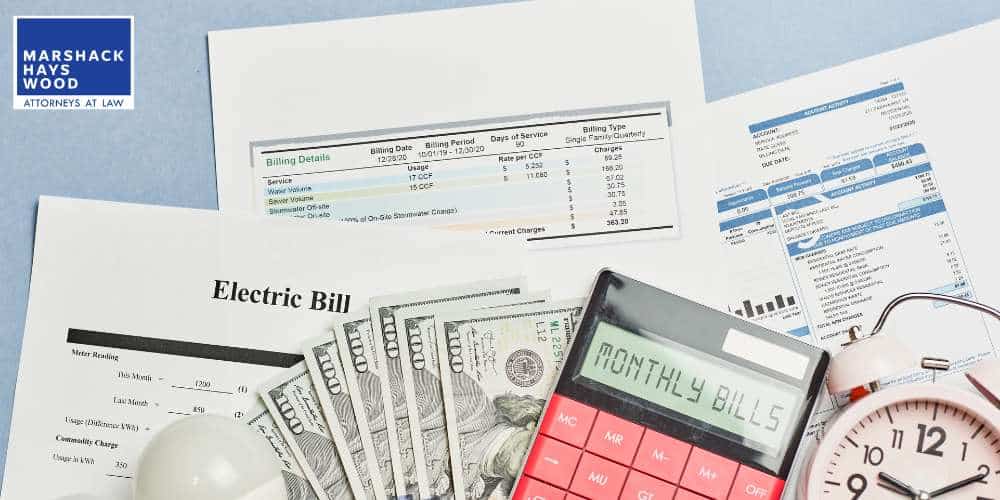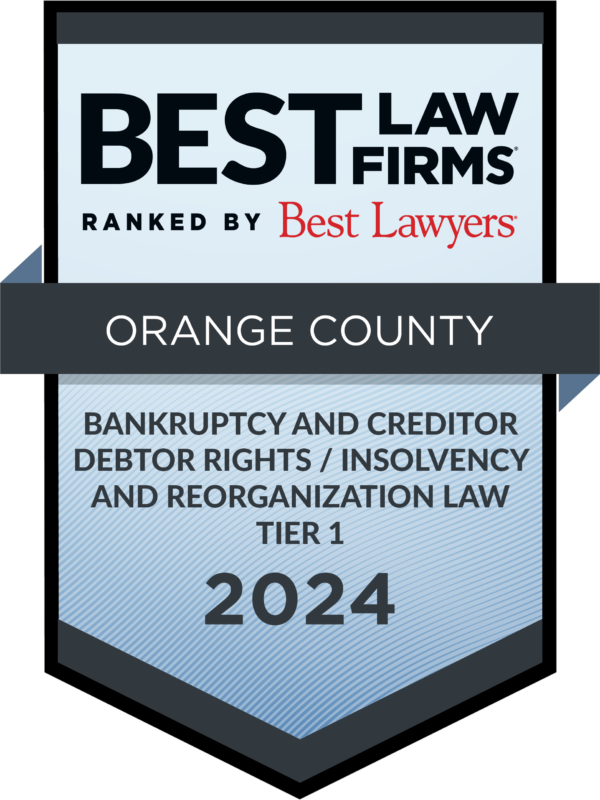In California, filing for bankruptcy when married can have a number of benefits, but it can also have drawbacks. While it’s not required, couples can file for bankruptcy together, allowing them to take advantage of things like consolidated debt, decreased filing costs, and more.
The Orange County bankruptcy attorneys at Marshack Hays Wood have extensive experience in handling bankruptcy cases and can help walk you through the process of filing jointly or separately. We’ll help you explore your bankruptcy options and ensure you and your spouse find the path that best suits your needs.
Begin your journey toward financial relief today. Call us at (949) 333-7777 to schedule a free consultation with a bankruptcy expert on our team.
What is Joint Bankruptcy?
Joint bankruptcy is when a married couple files for bankruptcy together as if they are one financial entity. Since many married couples combine their assets and split their financial responsibilities, filing for bankruptcy together can be easier, more streamlined, and more cost-effective than filing separate bankruptcy petitions.
While filing jointly can have its benefits, it’s not the best option for all couples. Couples considering joint bankruptcy consult with a qualified bankruptcy attorney before filing. They can help evaluate the couple’s potential options and ensure they are making the best decision for their financial recovery.
Joint bankruptcy in California is typically pursued under Chapter 7 or Chapter 13 bankruptcy. When choosing between these two chapters of the bankruptcy code, a bankruptcy attorney will evaluate the couple’s current financial situation as well as their long-term financial goals. This will ensure that both spouses file under the bankruptcy chapter that’s right for them.

What to Consider When Filing Bankruptcy While Married
When deciding whether or not to file jointly, there are a number of things a couple should take into account before taking action. Couples should thoroughly evaluate their financial situation, and consider things like income, assets, debts, and individual credit scores before deciding to file jointly.
Income
When considering bankruptcy in a marriage, it’s crucial to evaluate each spouse’s income. The couple’s joint income can play a significant role in determining eligibility for different bankruptcy chapters, such as Chapter 7 or Chapter 13.
Chapter 7 bankruptcy is often the preferred option for individuals and couples who are filing for bankruptcy. In order to file under Chapter 7, however, the couple has to have an income lower than the state median income for a household of their size.
A higher combined income might limit their options, making it more beneficial for one or both spouses to file individually rather than jointly. A bankruptcy lawyer will be able to evaluate the couple’s income and advise them on the best course of action.
Assets
It’s important that the couple assess their joint assets as well as their separate assets. When filing for bankruptcy, the petitioner (person filing for bankruptcy) must list all of their assets, including property, vehicles, savings, and investments.
Whether these assets are owned jointly or separately can influence how these assets are treated in the bankruptcy process. However, in community property states like California, any assets acquired during the marriage may still be considered community property and subject to division in bankruptcy, even if the assets were owned individually.
A bankruptcy attorney can evaluate a couple’s situation and explain how their joint and separate property will be evaluated in a joint bankruptcy, even in a community property state like California.

Individual and Joint Debts
It’s important to differentiate between individual and joint debts when filing for joint bankruptcy. Joint debts are liabilities both spouses are responsible for, all of which will be addressed in the bankruptcy process. However, individual debts (debts incurred by one spouse) can be more complex. If only one spouse files for bankruptcy, creditors may still pursue the non-filing spouse to pay the debts incurred by their spouse.
It’s also important that the petitioner evaluates the nature of his or her own debts, as well as any joint debt. Secured debts, such as a mortgage or car loan, are tied to specific collateral, like a home or car. These assets can be liquidated in the bankruptcy process, meaning they are sold to repay the outstanding debt balance. The couple may need to decide whether to surrender the collateral, reaffirm the debt, or redeem the property, depending on their goals and financial situation.
Exemptions
Bankruptcy exemptions are state and government-imposed protections on certain assets required for daily life, like a home, vehicle, or even retirement contributions payments. These exemptions determine which assets the couple can keep through the bankruptcy process, and maximizing these exemptions can help petitioners keep as much property as possible.
In some states, couples may double their exemptions if they file jointly, offering greater protection for their assets. However, California does not allow couples to double their exemptions, meaning that if they file a joint petition, their state exemption amounts will likely be cut in half. It’s important to review the specific bankruptcy exemptions in California and how they would apply to both joint and individual assets.
Credit Scores
Another thing couples should consider when filing for bankruptcy is the potential impact on one or both spouse’s credit scores. Consumers need a good credit rating in order to do things like take out a loan, apply for a mortgage, or rent an apartment or other property. While bankruptcy can offer a fresh start by eliminating debts, it can remain on a person’s credit report for 7-10.
Couples should weigh the short-term relief against the long-term implications on their credit profiles and discuss strategies for rebuilding credit post-bankruptcy. Additionally, joint bankruptcy may affect the credit scores of both spouses, potentially leading to challenges for both of them. If only one spouse files for bankruptcy, the non-affected spouse can take care of things like applying for loans while the other spouse rebuilds their credit score.
Is It Better to File Joint Bankruptcy or Separate Bankruptcy?
It depends on the situation. Every bankruptcy case is unique, and in some situations, it may be more beneficial to file separately rather than together. Anyone considering filing for bankruptcy should contact an experienced bankruptcy attorney regarding their case. They can evaluate the couple’s financial situation and goals, and advise them on whether a joint filing will work best for them.
Not only that, but bankruptcy attorneys will have an in-depth understanding of the bankruptcy process and the bankruptcy court system. This will allow them to help clients every step of the way, providing them with the legal advice and resources they need to complete their bankruptcy.
If you are looking for a dedicated bankruptcy team in Irvine, CA, the attorneys at Marshack Hays Wood are here to help. Call us at (949) 333-7777 to speak to a legal representative on our team.

How Does Bankruptcy Affect the Non-Filing Spouse?
Bankruptcy can affect both spouses, even if they decide to file separately. When one spouse files for bankruptcy in California, the other spouse may still be responsible for any joint debts they took on together, as well as any individual debts they had. Additionally, the non-filing spouse could suffer from a loss of property if any joint assets are liquidated.
What Is Included in the Bankruptcy Estate?
If only one spouse in the married couple files for bankruptcy, their estate will include any marital assets like community property as well as any community debt. The estate will also include any individual property and individual debt under the filing spouse’s name. Any property or assets owned by the non-filing spouse will likely be protected.
How to File Bankruptcy When Married
Filing for bankruptcy as a married individual requires careful consideration and planning. The first step is to decide whether to file jointly with your spouse or individually. From there, you’ll need to gather the documents needed to file your petition. You’ll also need to complete a credit counseling course within 180 days of filing your bankruptcy documents with the court.
The actual filing process begins with submitting a petition to the bankruptcy court. This petition will include forms detailing your financial status, as well as information regarding which bankruptcy chapter you are filing under.
Whether you’re filing jointly or separately, you should seek professional advice from an experienced bankruptcy attorney. A California bankruptcy attorney will have the experience required to help you and your spouse file for bankruptcy, ensuring your best interests are protected every step of the way.
Pros and Cons of Filing Joint Bankruptcy
Filing joint bankruptcy as a married couple can offer several advantages, but it can also come with potential drawbacks. One of the primary benefits is the streamlined process of handling debts. A joint bankruptcy filing consolidates both spouses’ debts, making it easier to manage and resolve them in a single legal procedure.
Since the process will be shorter and easier to manage compared to two separate bankruptcy filings, filing jointly can also help save on attorney fees. Additionally, when filing jointly, the couple will only have to pay one filing fee. Court filing fees stay the same, regardless of whether or not a person is filing separately or jointly.
However, there are cons to consider as well. Filing jointly affects the credit scores of both spouses. If one spouse has a significantly better credit score or fewer debts, they might benefit more from staying out of the bankruptcy filing to preserve their credit standing.
Additionally, in joint bankruptcy, all shared and individual assets of both spouses are part of the bankruptcy estate, which could put more property at risk of liquidation in a Chapter 7 filing. An attorney can provide personalized advice on whether joint bankruptcy is the best path, considering your specific debts, assets, and long-term financial goals.
What Happens to the Automatic Stay if Both Spouses File Bankruptcy?
Under bankruptcy law, those who file for bankruptcy are protected by a legal mechanism called the automatic stay. The automatic stay temporarily halts creditors from taking action against the petitioner or petitioners. This includes actions like foreclosure, repossession, wage garnishment, and lawsuits. The automatic stay is usually granted after an individual files their bankruptcy petition, and will last until their bankruptcy is complete.
If the spouses file separately, both individual bankruptcy proceedings will trigger their own automatic stay. This means that each spouse’s individual creditors are prohibited from pursuing collection actions against the assets included in either bankruptcy estate.

Contact the California Bankruptcy Lawyers at Marshack Hays Wood
Navigating the bankruptcy process, especially when married, can be a challenging and overwhelming experience. At Marshack Hays Wood, our bankruptcy lawyers are here to guide you and your partner every step of the way. With years of experience and a deep understanding of California bankruptcy laws, we can provide you with personalized and effective solutions tailored to your unique financial situation.
Whether you are considering a joint or individual bankruptcy filing, or simply seeking advice on how to protect your assets and future, our attorneys are here to help. Call us at (949) 333-7777 or contact us online to schedule a free consultation with an attorney at our firm.



